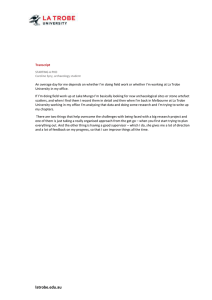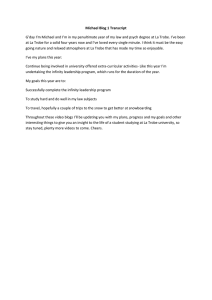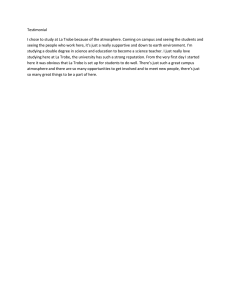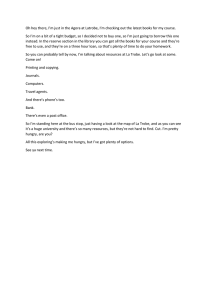Fiona Salisbury interview with Professor Jane Long Transcript
advertisement
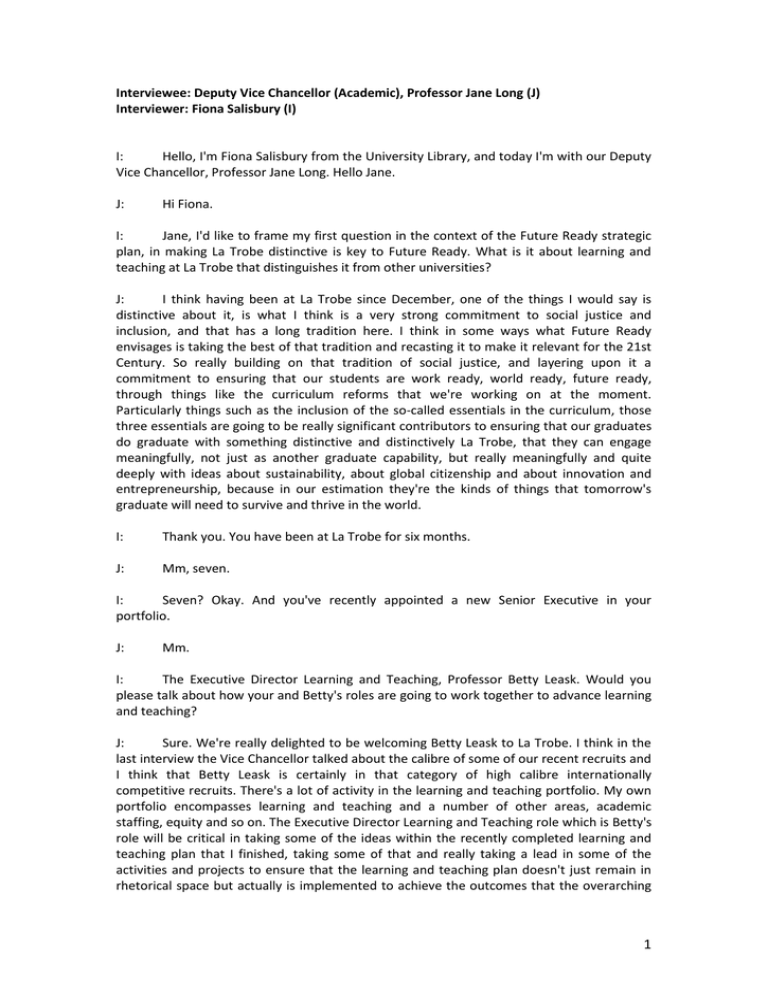
Interviewee: Deputy Vice Chancellor (Academic), Professor Jane Long (J) Interviewer: Fiona Salisbury (I) I: Hello, I'm Fiona Salisbury from the University Library, and today I'm with our Deputy Vice Chancellor, Professor Jane Long. Hello Jane. J: Hi Fiona. I: Jane, I'd like to frame my first question in the context of the Future Ready strategic plan, in making La Trobe distinctive is key to Future Ready. What is it about learning and teaching at La Trobe that distinguishes it from other universities? J: I think having been at La Trobe since December, one of the things I would say is distinctive about it, is what I think is a very strong commitment to social justice and inclusion, and that has a long tradition here. I think in some ways what Future Ready envisages is taking the best of that tradition and recasting it to make it relevant for the 21st Century. So really building on that tradition of social justice, and layering upon it a commitment to ensuring that our students are work ready, world ready, future ready, through things like the curriculum reforms that we're working on at the moment. Particularly things such as the inclusion of the so-called essentials in the curriculum, those three essentials are going to be really significant contributors to ensuring that our graduates do graduate with something distinctive and distinctively La Trobe, that they can engage meaningfully, not just as another graduate capability, but really meaningfully and quite deeply with ideas about sustainability, about global citizenship and about innovation and entrepreneurship, because in our estimation they're the kinds of things that tomorrow's graduate will need to survive and thrive in the world. I: Thank you. You have been at La Trobe for six months. J: Mm, seven. I: Seven? Okay. And you've recently appointed a new Senior Executive in your portfolio. J: Mm. I: The Executive Director Learning and Teaching, Professor Betty Leask. Would you please talk about how your and Betty's roles are going to work together to advance learning and teaching? J: Sure. We're really delighted to be welcoming Betty Leask to La Trobe. I think in the last interview the Vice Chancellor talked about the calibre of some of our recent recruits and I think that Betty Leask is certainly in that category of high calibre internationally competitive recruits. There's a lot of activity in the learning and teaching portfolio. My own portfolio encompasses learning and teaching and a number of other areas, academic staffing, equity and so on. The Executive Director Learning and Teaching role which is Betty's role will be critical in taking some of the ideas within the recently completed learning and teaching plan that I finished, taking some of that and really taking a lead in some of the activities and projects to ensure that the learning and teaching plan doesn't just remain in rhetorical space but actually is implemented to achieve the outcomes that the overarching 1 Future Ready strategy has committed us to. So she'll have a lot to do when she gets here. The role itself, I thought warranted an executive director level appointment. As a statement about our commitment to great and learning and teaching at La Trobe, it's really a fusion of a previous Pro-Vice Chancellor role and a Director role, but the incoming Executive Director will have oversight of our curriculum teaching and learning centre. But she'll also be responsible for our student enrichment area which as people would know has responsibility currently for things like student orientation, transition, career development and work integrated learning. And that piece is one that we've made strong commitments to within our strategy to ensure that our students really are exposed to the workplace and to think about not only our curriculum, but co-curricular activities including volunteering that we think are an essential part of the student learning experience. So in a way, to some extent the academic work's always going to be important, but recognising the experiences and work that students undertake outside the classroom is also really vital to their success in future. So Professor Leask will have a lot to do in that area and she arrives in late September, and I'm looking forward to it very much. I: Thank you. Taking a ... looking again at the learning and teaching plan, I understand that radical learning and future learning are key elements of that plan. How will those two programs intersect in the teaching and learning plan? J: Radical learning and future learning, I think are two sides of the same coin in that both, to some extent, are part of a project to try to imagine what learning will look like in future, and the kinds of teaching and learning delivery in which La Trobe should be engaged, to not simply keep up with the game, but to be ahead of it. Again, very firmly focused on learning outcomes for students, so the first thing I would say about both radical learning and future learning, is it's not about faddishness, it's not about MOOCS for the sake of MOOCS. We've heard a lot about that lately. And I'm not really interested in fads. I think what we're all interested in is thinking about flexible delivery, other forms of delivery that are most engaging and most effective for students. What the radical learning project and our emphasis on future learning does really is to take us firmly into that realm and to think what kinds of strides can we make to ensure that we are delivering to the needs of students, because we're dealing with an increasingly diverse student cohort. A lot of students require a flexibility that perhaps we didn't need a generation ago because so many of them work, we're building our post-graduate course work cohort, they're very busy people. Similarly, we know that today's students are much more switched in, not only to online delivery, but to things like mobile devices, social media, so it's really an imperative within our pedagogy and within our delivery, to take stock and think how do we utilise those resources in a way that is going to benefit student learning. Some of it isn't as well, I should say, about the whizz bang technology, some of it is rethinking our approaches to pedagogy that may be about putting more emphasis on group work. It may be about emphasising modes of learning that we know work really well, such as peer assisted learning. Students learn a heck of a lot from one another. So it's really looking across our suite of subjects and indeed of courses, and thinking in a multi-campus university, how do we deliver that effectively? I: Mm, that's what that's about. J: Mm. I: As you know, I'm a librarian. J: Mm. 2 I: And so a lot of these things that you're talking about I'm really interested in from the perspective of what's happening in libraries and the future of libraries. J: Yes. I: So could you please comment on what you think the future is for libraries and librarians in terms of teaching and learning? J: Sure, I would say, my own background I'm an historian, so I have a long history as an archive rat (both laughing). I love libraries in all their forms, both in virtual, in terms of what they can deliver virtually as well as in physical form. I think, myself, that any commentators who have predicted the demise of libraries have been absolutely premature, and not only that but actually incorrect. I: Great (chuckling). J: 'Because libraries, in my mind, remain very much at the heart of universities in terms of research and also in relation to learning and teaching. They have a vital role to play and in some ways have been in the vanguard of developments in eResearch and thinking through some of the delivery challenges in learning and teaching, and in online skills development, things of that nature. But I also see a very strong future for the physical library in the future as well. One of the things we know as a university that's really keen to retain our students and to engage them, is particularly for undergraduate students, a sense of familiarity and connectedness to a place can have an enormously beneficial effect on their study and the outcomes for them educationally. There are few places that have a better buzz and are more attractive I think to students than the library at La Trobe, Bundoora, but having travelled around and visited our regional centres, in that way the library already exemplifies a direction we're all moving in which is of really effective networks of people, of knowledge, of capacity that we're going to have to exploit more in future. So libraries, big tick. I: Yeah. No, that sounds really fantastic and a really positive future for the library as part of the university community. J: I think so. I: Changing focus now, do you think gender roles in leadership are relevant in higher education today, and related to that are you a leader who is female or a female leader? J: Oh. This is my ... one of my second favourite areas, which is I've done a lot of work in the area of gender theory, so I'd probably be the last person in the world to say that in broad terms gender doesn't matter. We're recording this on the day that the entire university is talking about the birth of a new English member of the Royal Family ... well the member of the English Royal Family and the headline everywhere has gone out, it's a boy. If I think about that, if I think about whatever the politics of it, some of the recent or some of the representations of our immediate past Prime Minister, I think it's clear that gender matters, and it is a major area of differentiation in our cultural life. I think it's interesting that gender often actually means female. We don't actually stop and think, what's it like being a male leader. So in answer to the question, am I a female leader or a ... the other way. I: A leader who is female, yeah. 3 J: Yes, a leader who is female, I'd say probably both. Some days neither. I think it's one of a number of identities that I have, historian, mother, DVCA, where depending on the context gender can be more or less significant. Sometimes it may be an issue, other times it may be far less relevant or apparently it may disappear altogether. Probably not altogether though (chuckling). I: Thank you very much. Now my final question is about reading. J: Mm-hm. I: It's a bit of a bookish question. I have to finish on a bookish question. J: That's right, I'm bookish. I: Yeah. Which female character from fiction would you like to meet and why? J: Oh. I do love reading. That's an interesting and difficult question. Who would I like to meet? Difficult because a lot of the female characters, particularly in the conventions of western novels are pretty uninteresting, but they're either tragic like Miss Haversham or they save people and then live happily ever after like Jane Eyre, or they have a chequered but tragic existence like Hester Prynne, if I think about novels historically. So I'd probably plump for thinking about alternative genres. Now I would immediately go to one of my childhood favourites, I must say, the character of George in the Famous Five. I: Right. J: Georgina, who always used to get into trouble and sent to bed without any supper, which I thought was incredibly unfair and if I met her I'd probably say I thought it was unfair because I'm sure she had the biggest fan base and she actually got the job done, and then she'd get punished for it (chuckling), so poor old George. But I really enjoyed that character. And maybe a grown up version of that, the other character who I would like to meet to have a chat with, is Molly from William Gibson from the Sprawl Trilogy. Molly Millions starting from Neuromancer, who of course is cybernetic, she has mirror shades for eyes, she has extending claws for fingernails and I just think she's a fascinating although secondary character in some ways because she drives the plot and she does that in unexpected ways, she's a complex character, she raises most importantly, for me, raises a whole range of much deeper questions and issues, that make me think. So she's, I suppose, inviting us to think about body augmentation at a time when that's becoming more commonplace. She's getting us to think about loyalty and morality and what the bounds of that might be, and I guess the ethics of artificial intelligence, but all wrapped up in a fantastic package. So I'd really like to meet Molly and to ask her a question or two, probably where do you get your nails done? I: Thank you, Jane. Thank you so much for those interesting answers and thank you very much for your time today. J: Thank you, Fiona, my pleasure. End of recording 4
